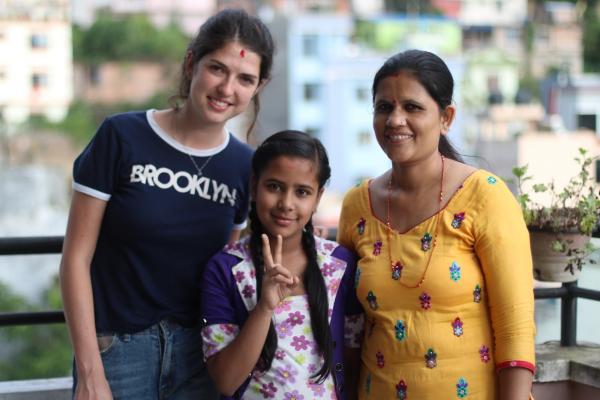Who could fail to be moved by the sight of these hill farmers waiting patiently above the courtyard of the Nangi elementary school for their children’s Grade 5 results ceremony to begin? All day they’ve been trickling in from the surrounding villages, in some cases walking more than three hours to be here.
Nearly one hundred children are taking part in the ceremony. Those who pass will be eligible to continue on toward the School Leaving Certificate (SLC) and the uncertain benefits of a Nepali education.
Nangi is in central Nepal in the Myagdi district about 100 km northwest of the city of Pokhara. The village is way out in the countryside on a terraced hilltop not far from the Annapurna massif. The scenery is mind-boggling. From Nangi it’s about a four hour walk to the popular "Annapurna trekking circuit".
I spent part of 2004 volunteering in Nangi for the US-based Himanchal Foundation. Almost no one visits Nangi, because it’s too difficult to find. While there, besides teaching, I undertook my own micro-project: marking the trail from the Annapurna Circuit to the village so that tourists can come and check their e-mail. Essentially, I spent a couple of weeks nailing little plaques onto trees and painting rocks.
About 600 people live in the village, and most of them are farmers. The school attracts students from many surrounding villages. The elementary school is a low flat building, brick whitewashed with lime. The new high school is two stories with four classrooms and a veranda on the second floor.
Given the political and economic situation in Nepal, a School Leaving Certificate is not a guarantee of a better life. The country has been drifting in and out of chaos since 1996. Even a secondary school teacher (with a university education) earns only about $150 a month. The kind of education that really guarantees social mobility is an English education, available at private schools, something that is out of reach for most families.
It is late afternoon and the clusters of families are still gathering on the grassy amphitheatre above the school. Dads are squatting on their hams, puffing nervously on cheap Nepali cigarettes. Moms, their heads covered by shawls, are cradling small children between their knees. For such a large crowd they are amazingly silent, and I suddenly realise how much is at stake for them.
If the kids fail they have to repeat the year. The standards are strict and a significant minority fail every year. The teachers have no pity in this regard. Also, Nangi does charge a nominal tuition fee, so the families are making sacrifices to send the kids to school. In Nepal, people haven't yet come to take schooling for granted and the parents here display the kind of concern and pride I’m used to seeing at University convocations in the west. For many of these parents, their children may be the first in the family to receive an education. However uncertain its benefits are, education remains the only alternative for a better future.
Down in the sandy courtyard, three long tables have been set up. The school’s entire staff of a dozen or so teachers is seated here. Most are highly educated men and women, fanatically dedicated to their jobs, though from the looks of it, they are almost as down-at-the-heels as the parents. They are wearing shabby, moth eaten sweaters and plastic flip-flops. A few are sporting over-sized toques as protection against the wind.
From their vantage point, the parents gaze at the teachers reverently, like fans at a rock concert. The teachers take this attention in stride, fully aware of the prestige their position carries in Nepali society. Over their shoulders a feather of snow twirls away from the summit of Dhaulagiri, the world’s seventh highest mountain.
After what seems like an interminable series of speeches, the successful candidates are finally announced. As soon as they hear their names, the kids leap up from where they are sitting, and scamper down to the courtyard like little goats. The young scholars receive a prize of a cheap notebook and the principal applies a broad red stripe on their foreheads like a tikka mark.
This is their day in the sun, and some of the little girls look as radiant as Nicole Kidman collecting an Academy Award. When you consider the obstacles these kids have to face –the distance they have to travel to school, the scanty resources, the civil war – the achievement is truly amazing. Their ear-to-ear smiles tell the whole story.
Fred Sengmueller was born and raised in Toronto. He is currently living in Quebec City where he teaches ESL.
Add this article to your reading list



